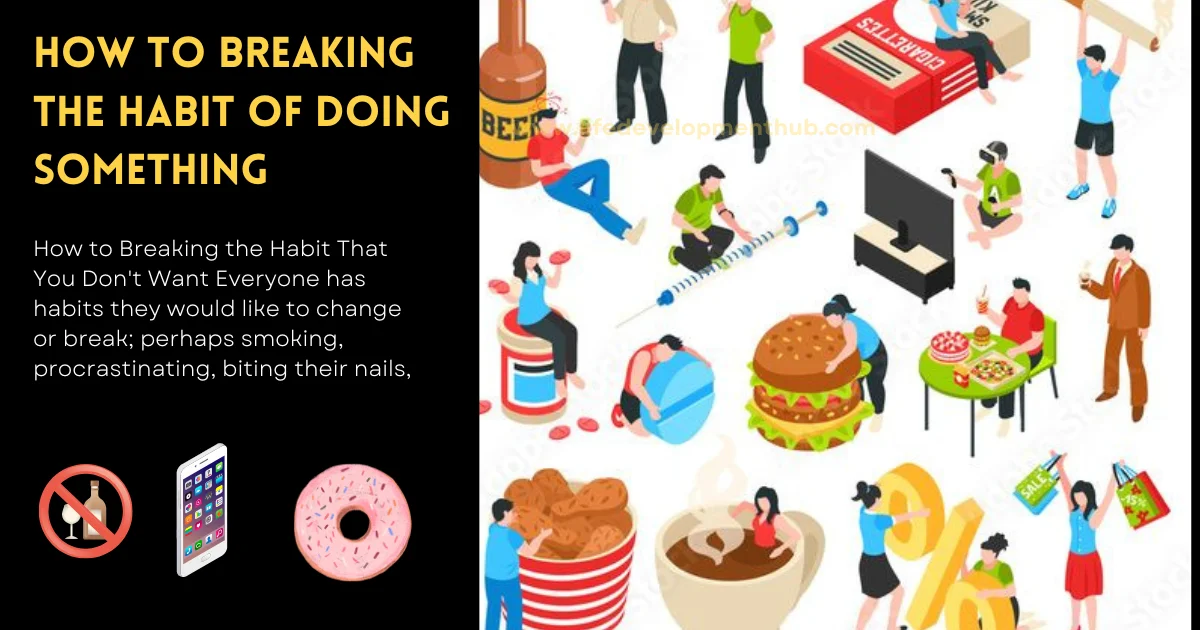How to Breaking the Habit That You Don’t Want Everyone has habits they would like to change or break; perhaps smoking, procrastinating, biting their nails, or eating junk food. Whatever it may be, we know it’s not good for us but still find it hard to resist doing it.
The article explains what a habit is, how it forms, and how to disrupt it. It also provides tips and strategies to overcome the common barriers to breaking a habit.
Why can breaking habits be so challenging, and how can you break the cycle of doing things that you no longer wish to?
What is a Habit and How Can It Form?
A habit is defined as any repetitive action that has become automatic over time and becomes unconscious, usually due to repetition. A process called the Habit Loop involves three elements – cue, routine, and reward – for habit formation.
A cue is any indicator that begins a behavior, such as time, place, person, emotion or sensation. It could be anything that triggers it – from time and place reminders to emotions or sensations that lead to our habits being repeated again and again.
Routine refers to your behavior itself, whether physical, mental, or emotional. For instance, smoking cigarettes, checking phones, or eating cookies might all constitute routines in response to specific triggers.
Reward is any outcome that results from our behavior that brings pleasure, relief, satisfaction, or validation.
Habit loops form neural pathways in your brain that reinforce behavior. Repeating it further strengthens this connection, making the habit even harder to break as its effects become embedded deep within both mind and body. For this reason, habits are difficult to change once they have become established in both, making their removal even harder.
Are You Struggling with Breaking an Addiction Habit vrei Breaking habits can be hard work, but it is possible. Understanding your habit loop and taking steps to break it are necessary steps in breaking an unwanted routine. Here are a few steps that may help break this one:
Establish the trigger, routine, and reward of your habit. It is important to understand what sets off your behavior and its rewards; one way of doing this is keeping a journal detailing each time it occurs and asking yourself questions such as When, Where, Who with and What are My Gains From Doing this Habit.
Establish healthier alternatives.
It is essential that you find another activity which provides similar relief without its negative consequences; for instance if smoking relieves stress for example you could consider meditation, exercising or listening to music instead. Likewise if procrastinating was keeping you bored you could try reading, learning or playing a game instead; chewing gum, squeezing stress balls or doing breathing exercises might also work better as alternatives than biting nails for anxiety relief.
Modify or eliminate the cue. In order to change your habit, make it harder for yourself to encounter its triggers or modify how you respond. For instance, if smoking when seeing cigarettes becomes part of a trigger for you, take steps such as throwing or hiding away packs, switching brands you don’t like or turning off notifications on phones; when hearing notifications turn them off or put them on airplane mode; when snacking when seeing junk food in the fridge it could help if this was removed altogether or replaced with healthier options or stored away less visibly somewhere less visible – which could help break this cycle and change how often triggered it becomes.
Celebrate and reward yourself for progress. Rewarding yourself can reinforce positive behaviors with positive reinforcement and incentives, including celebrating accomplishments, tracking results and rewarding yourself with something enjoyable or sharing successes with others. FAQs may provide further help on this matter.
Q: How long will it take to break my habit?
A: There is no simple answer to this question as it depends on various factors like type, frequency, and intensity of habit as well as personality, motivation, environment, and support systems. For best results, it is wise to be consistent in making changes over a two-month period before it becomes automatic and effortless.
Q: What are some common barriers to breaking habits?
A: Some common obstacles include:Lack of awareness: You may be unaware that you have an unhealthy or unwanted habit or its implications on you and others.
Insufficient motivation: Without clear or compelling reasons to break your habit, or belief that change is possible, self-control issues may cause temptations or cravings to surface – or justification may become rationalizations of a routine lifestyle that makes sense in your mind.
Lack of Support/Accountability:
Your support may be lacking and resources for changing habits might not be readily available to you – such as time, money or tools to do it – which create barriers in the way.
Q: How Can I Overcome These Barriers?
A: These barriers can be overcome by: Raising Awareness: By becoming more educated about your habits and their causes/consequences/alternatives you can better manage them as well as monitor its triggers while reflecting upon how it makes you feel.
Increase Your Motivation: In order to motivate yourself when changing a habit, setting specific, measurable, attainable, relevant, and time-bound (SMART) goals for it can help. SMART goals provide clarity as to the benefits and costs of changing or not changing habits; visualizing desired outcomes helps confirm ability and commitment – this approach may work.
Enhancing self-control:
Planning ahead can help prepare you for possible temptations, impulses, or cravings and devise ways of dealing with them effectively. Using mindfulness techniques such as distraction or delay may also be effective against habit formation; as can limiting or avoiding situations or people that trigger your habit or altering the way in which you respond to them.
Expanding Your Support
Seek assistance from friends, family, professionals, or coaches who can offer advice or coaching to aid in habit change. Consider joining groups or communities that share similar goals or experiences – ask someone to be your accountability partner who will check in regularly with your progress and remind you about your goal!
Expand Your Resources:
Allocating more time, money or tools can help change habits or find solutions to obstacles or challenges which impede this change.
Conclusion:
Breaking an unwanted habit isn’t an easy feat, but it is certainly achievable. To successfully do so, one needs to understand their habit loop and know how to disrupt it; they should identify cues, routines and rewards related to your habit; change or modify any triggers as needed and reward themselves on progress made; overcome common barriers like lack of awareness, motivation, self-control support resources in order to replace your unwanted routine with something healthier; then follow these steps so they can create something much better suited to them in their place – making life much better overall for everyone involved.

